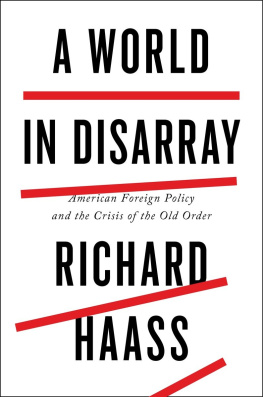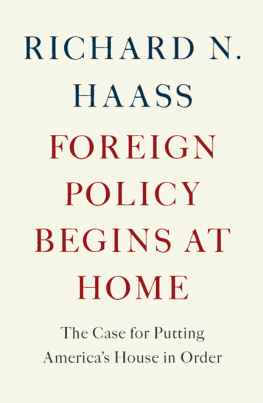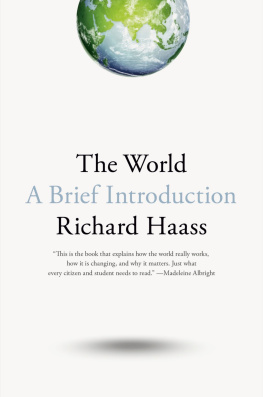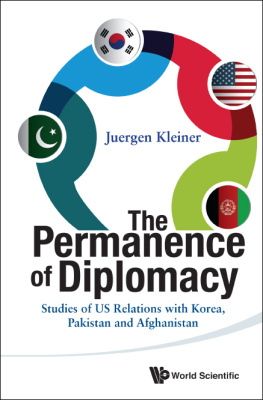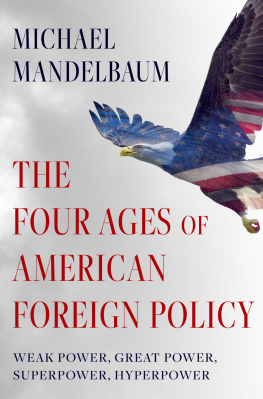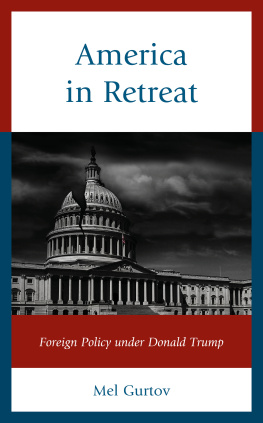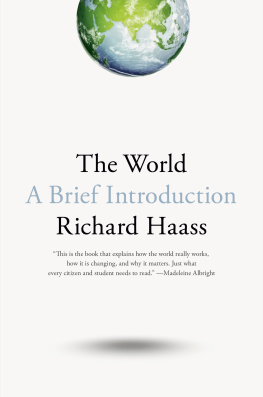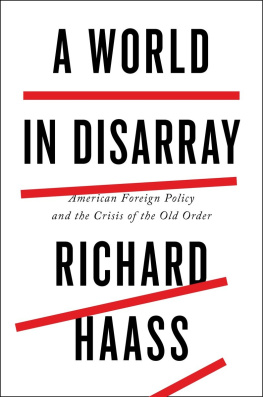Penguin supports copyright. Copyright fuels creativity, encourages diverse voices, promotes free speech, and creates a vibrant culture. Thank you for buying an authorized edition of this book and for complying with copyright laws by not reproducing, scanning, or distributing any part of it in any form without permission. You are supporting writers and allowing Penguin to continue to publish books for every reader.
While the author has made every effort to provide accurate Internet addresses and other contact information at the time of publication, neither the publisher nor the author assumes any responsibility for errors or for changes that occur after publication. Further, the publisher does not have any control over and does not assume any responsibility for author or third-party Web sites or their content.
Foreword
A World in Disarray concludes with the chapter A Country in Disarray. The 2016 presidential campaign, which ended after this book was completed, underscored this judgment by highlighting multiple divisions within American society that are both long-standing and deep.
One result of the election is greater uncertainty over the future trajectory of U.S. foreign policy. As the subtitle of this book suggests, support for the old order has crumbled, the result of heightened economic anxiety at home (often associated with globalization, free trade, and immigration) and growing doubts about the costs and benefits associated with what the United States has been doing abroad, including fighting several open-ended wars in the Middle East and supporting allies in Europe and Asia. It is significant that Donald Trump, the winning candidate, called for putting America First.
The rest of the world has taken note. Assumptions about the willingness of the United States to continue doing what it has been doing in the world are being questioned as never before by friends, foes, and everyone in between.
All this, along with an inbox best described as daunting in the quantity and quality of the challenges filling it, is what awaits the forty-fifth president, who, like his predecessors, will enjoy great latitude in matters of national security. It is of course impossible to know what sort of foreign policy will emerge from the United States and how other countries and entities will react. Still, it is difficult not to take seriously the possibility that one historical era is ending and another beginning.
Introduction
O n June 23, 2016, a narrow majority of those British citizens who went to the polls voted in favor of a referendum that called for an end to their countrys membership in the European Union. Those voting for Brexit may have wanted to voice their frustration with low levels of economic growth, anger over immigration, fears of unemployment, or unhappiness with a portion of their taxes going to an institution based in Brussels that often seemed remote in order to support countries that often seemed to be profligate. Some voters may simply have wanted to register a protest against the politicians ruling the country. But whatever the motives, the results were profound, affecting not just the future of the United Kingdom and Europe but that of the United States and the entire world as well.
If Brexit actually happens, depending on its terms it could lead to the breakup of the United Kingdom and a partial unraveling of the EU. If this was to occur, the historic project of European integration born in the wake of the Second World War, an accomplishment that has brought unprecedented prosperity and stability to a continent that had all too often known war, would be placed at risk. Also at risk would be the so-called special relationship between the United States and the United Kingdom, often Americas closest and most important partner and ally in the world.
But even if Brexit or the worst of it is somehow avoided, that it garnered the support it did in a country such as the United Kingdom tells us that there are fewer givens in the world than many of usindeed, most of usassumed. Populism and nationalism are on the rise. What we are witnessing is a widespread rejection of globalization and international involvement and, as a result, a questioning of long-standing postures and policies, from openness to trade and immigrants to a willingness to maintain alliances and overseas commitments. This questioning is by no means limited to Great Britain; there are signs of it throughout Europe, in the United States, and nearly everywhere else.
All this is a far cry from the optimism and confidence that were just as widespread a quarter of a century before. One source of this mood was the fall of the Berlin Wall on November 9, 1989 (11/9 of all days), an event that heralded the peaceful and successful demise of the Cold War, the unprecedented struggle between the United States and the Soviet Union that had defined much of international relations for the four decades following the end of the Second World War.
This was followed less than a year later by a remarkable coming together of the world to turn back Saddam Husseins effort to conquer Kuwait, something that would have had enormous consequences if it had been allowed to stand. The administration of George Herbert Walker Bush, the forty-first president of the United States, saw what Iraq had done and its likely consequences not just in immediate and local terms but also historically, as the opening event of the postCold War era. The president and those around him (including me, then a special assistant to the president and the principal adviser for the Middle East, Persian Gulf, and South Asia on the National Security Council staff) saw developments as constituting a precedent that could well give the new geopolitical era its character. Depending on what was done in response to Saddams aggression and act of conquest, the postCold War world could be one of international order or disorder on a large scale.
It was thus for reasons both local and global, direct and indirect, that the United States did what it did and in the way it did it. Toward that end, the United States worked closely with the other fourteen members of the United Nations Security Council to repudiate Iraqs aggression and to establish and subsequently enforce a sanctions regime designed to ensure that Iraq would not benefit from its conquest and would pay an enormous price for it. A large coalition of dozens of countries contributing in different ways was built to make sure Iraqi aggression did not threaten Saudi Arabia and, when diplomacy backed by sanctions failed to dislodge Iraq from Kuwait, to force Iraq out of that country and to restore Kuwaits independence and government.

